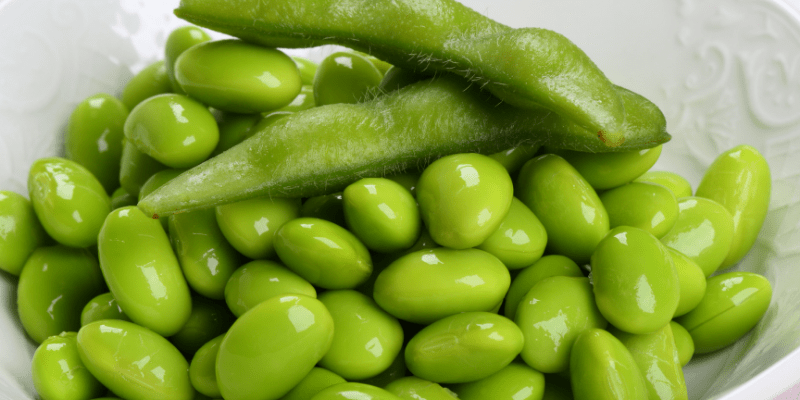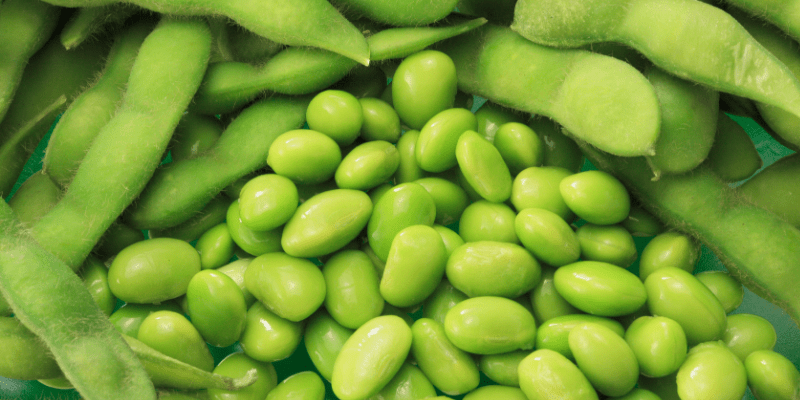Edamame beans, widely used in Asian cooking, can be found in various forms such as raw, fried, baked, and more. They are favored in numerous diets due to their rich nutrient content and satisfying nature. While your furry friend might be curious about your food, the question arises – Can Cats Eat Edamame? Let’s explore more things!
Take Away Infromation
Edamame, typically consisting of two to three beans per pod, is not toxic to cats, but can be hard for them to digest. It can be harmful if consumed raw; thus, it’s advised to cook the beans before offering them to your cat.
What Is Edamame?
Edamame refers to immature soybeans harvested before they have a chance to harden fully. They are typically served as snacks, appetizers, or side dishes and can be found fresh, frozen, shelled, or still in their pods. Base on its flavor and numerous health benefits, edamame is the most popular in the world not only in East Asia.
Edamame are known as a rich source of protein, nutrients such as vitamin K, folate, iron, vitamin C, and calcium. It’s low in calories, cholesterol-free, and gluten-free. However, our main interest here is not humans but our feline friends!
Read more: Can Cats Eat Pretzels? All You Need To Know
Any Benefits from Edamame for Cats?
There are no mean if edamame is in cats diet though it’s nutrient-rich and non-toxic. Cats are known as obligate or strict carnivores, implying that their nutritional requirements can be completely met by consuming meat.
Cats digestive ca not totally using for plant-based food, the way they do for meat not the same to plant. Therefore, edamame does not play an important role in cats diet as meat as human eventhough they are not harm to them.
Is Edamame Harmful to Cats?
As black beans, edamame is not poisonous to cats, but it can trigger food allergies, sensitivities, and disturb the digestive system. Although it is uncommon for cats to have soy-related food allergies, it is not impossible. Further, their difficulty digesting plant-based foods may lead to symptoms like gas, diarrhea, stomach discomfort, and occasional vomiting.
If your cat ingests a small quantity of edamame, the most likely outcome would be minor digestive upset. Nonetheless, you should always contact your vet if your cat displays any unusual or concerning symptoms after eating it.
Read more: Can Cats Eat Chicken Nuggets? All You Need To Know
Our Related Video
Read More: How to Treat Anemia in Cats Naturally?
Cautions Before Feeding Edamame
If you decide to offer edamame to your cat, it’s advisable to start with a small quantity to check for any allergic reactions or digestive discomfort. If your cat tolerates edamame well, you may include it occasionally in their diet.
Edamame, with its rich nutritional profile, can serve as a healthy treat but should only be given in moderation. Cats have specific dietary needs that are optimally met through commercial cat food. Replacing substantial parts of your cat’s regular diet with edamame could lead to nutrient deficiencies and associated health issues.
Cats, as obligate carnivores, require animal protein sources for survival. While the additional protein in edamame doesn’t cause harm, it’s not a substitute for protein-rich cat food.
Edamame is high in fiber, which can support smooth digestion in cats. Gastrointestinal issues like gas, bloating, diarrhea, or constipation could exhibit when cats consume a big amount of Edamame.
Read more: Can Cats Eat Cheerios? What Is Cat Natural Diet?
How To Feed Edamame to Cats?
Edamame’s versatility enhances its appeal in human diets, but this isn’t the case for cats. When feeding edamame to your cat, keep it simple and minimal. It’s crucial never to feed your cat edamame that has been prepared with other foods.
Offer your cat plain edamame without any seasoning, salt, or spices. If possible, select fresh or frozen edamame without any added ingredients. Refrain from frying edamame or preparing it using high-fat cooking methods.
You can de-shell edamame and offer it as a food topping or an occasional treat. Never feed your cat whole edamame beans in the shell as it may pose a choking risk or cause digestive problems.
Any Symptoms When Cats Eat Edamame
Understanding the symptoms that may surface due to food allergies and sensitivities is important. Any unusual signs should be immediately reported to your vet for accurate diagnosis and treatment. Symptom included:
- Diarrhea
- Gas
- Vomiting
- Frequent scratching
- Hair loss
- Red, inflamed skin
- Skin lesions
- Chronic ear infections
- Coughing, sneezing, wheezing
Are Soybeans Harmful to Cats?
Although soybeans are not toxic to cats, it’s recommended to stick with edamame and steer clear of mature soybeans. While soy may be included in commercial cat foods, it is extensively processed to improve its digestibility. Raw soybeans could be harsh on your cat’s stomach and difficult to digest, thus negating any potential benefits. Cats with hyperthyroidism, in particular, should avoid soybeans.
If you are intent on offering soybeans to your cat, ensure they are cooked. At first feed edamame as a treat rather than a regular part of your cat’s diet.
Read more: Are Tabby Cats Hypoallergenic? Tips For New Cat Parents
Cat’s Nutritional Needs
Every species naturally has unique nutritional needs. Being carnivores, cats require a high intake of animal-sourced protein as compared to other animals. Their bodies can efficiently break down and absorb this type of protein, which is essential for muscle preservation, energy, skin and coat health, mobility, immunity, among other functions.
Cat’s nutritional needs keys:
- Protein: Protein is supporting skin and coat health for cats as Bengal, Tabby or Siamese less loss hair. Also help cats healthy muscles, providing energy and amino acids that cats need, such as taurine which cats can not sufficient quantities themselves. You can consider some source of protein as salmon, tuna, Chicken, homemade rangoon crab, Crab,…
- Fats: Cats need fats in their diet for energy and for absorption of fat-soluble vitamins. Certain fatty acids, like arachidonic acid, are also essential in a cat’s diet because they cannot produce them internally.
- Vitamins and Minerals: Cats require a variety of vitamins and minerals in their diet. These include vitamin A, vitamin D, and certain B vitamins that they cannot produce themselves. Minerals like calcium, phosphorus, and iron are also vital for their health. Some fruits and vegetables are rich vitamins: Bell Peppers, Beets, Blackberries, Applesauce and Apple, homemade hummus from chickpeas, cooked black beans, Edamame,…
- Water: Proper hydration is crucial for a cat’s health. In the wild, cats get most of their water from the prey they eat. At home, it’s important to provide fresh water at all times. Some cat owners opt for wet cat food to help increase their cat’s water intake.
- Limited Carbohydrates: Cats have a limited ability to process carbohydrates because, in the wild, their diet consists mainly of protein and minimal carbs. Excess carbs can lead to obesity and related health problems. Some sources of carbohydrates cats should avoid: Pretzels, Cheerios,…
- Taurine: This is an essential amino acid that cats can’t produce in sufficient amounts themselves. It’s critical for heart health, vision, and reproduction. A deficiency can lead to serious health issues, including heart disease.
Besides, feeding cats avoid foods containing preservatives, salt, sugar, spices, colorants,…such as: pickles, sausage, marshmallows,…
Read more: How To Get A Cat Out Of Heat Q Tip? (6 Bonus Tips)
What to Consider?
While the majority of cat foods available in the market are formulated to satisfy a cat’s nutritional needs, the quality can vary, and what suits one cat may not necessarily suit another. For accurate advice on your cat’s dietary requirements, it’s always best to consult your veterinarian. However, several factors are worth considering when selecting cat food.
- Age: Cats at different life stages – form a kitten to adults a cat and seniors – have varying nutritional requirements. The food you select should be appropriate for your cat’s age. For example, kittens require high-energy food to support their rapid growth and development, while seniors, who are typically less active, need a diet that prevents weight gain.
- Overall Health: Any underlying health conditions your cat may have can influence their dietary needs. For instance, cats with food allergies or sensitivities may need to avoid certain ingredients. In more serious cases, like kidney disease, a specialized diet may be necessary. Regular vet check-ups can monitor your cat’s health if they are a pregnant cat or cats with diseases as Bipolar, Feline Leukemia, cat using Subcutaneous Fluids, or cats in heat, and any dietary adjustments required due to health issues should be discussed with your vet.
- Type of Food: Various types of cat food, such as dry kibble, wet canned food, fresh, and freeze-dried options, are available in the market. You might consider offering a combination for variety and added health benefits, although this isn’t strictly necessary. Each type has its pros and cons: dry food is cheaper and can be left out for longer, but it is typically lower in protein and moisture and higher in carbohydrates. Conversely, wet food has fewer carbohydrates and more moisture and protein but is generally more expensive and can spoil if left out too long.
- Quality: Understanding how to read labels and check the ingredients of your cat’s food is an effective way to evaluate its quality. High-quality cat foods will list real meat from animal protein sources as the first ingredients. Avoid foods with unnecessary fillers, by-products, artificial colors, flavors, and preservatives. Choosing a brand that meets the AAFCO pet food guidelines ensures it has been tested for quality and safety.
Read more: Can Cats Have Crab Rangoon? What You Need To Know
Q&A about Can Cats Eat Edamame? Is It Toxic To Cats?
Can a cat be vegan?
Cats are obligate carnivores, which means they require certain nutrients found in animal-based proteins. They need a substance called taurine, found naturally in meat, to maintain their health. A deficiency in taurine can lead to serious health problems, including heart disease. A vegan diet, therefore, is not suitable or healthy for cats.
If you are vegan, your cats can beg you while you are eating, don’t be tricked, it just there habit likely bite your nose or guard you when you pee, sleep pressed up against you or jumping on TV,…Remember, cats are not human, they can not be a vegan.
Can cats eat tofu?
Tofu, made from soybeans, is not toxic to cats. However, it should not be used as a protein substitute since cats require specific proteins found only in meat. Tofu can be given as a small treat occasionally, but it’s crucial to ensure that it doesn’t contain any seasonings, spices, or other ingredients that could be harmful to cats.
Do cats like soy protein?
Cats’ preferences can vary greatly. Some might like the taste of soy protein, while others might not. However, it’s essential to note that soy protein doesn’t provide all the necessary nutrients cats require and cannot replace animal-based proteins in a cat’s diet. While soy is often used as a filler in some commercial cat foods, it should not be a primary source of protein.
What protein are cats most allergic to?
Cats can develop allergies to any type of protein, but the most common allergies in cats are to proteins found in beef, dairy, and fish. It’s important to remember that allergies can develop over time, even if a cat has been eating the same food for years without issue. Signs of a food allergy can include skin issues, gastrointestinal upset, and respiratory problems. If you suspect your cat has a food allergy, it’s important to consult with a veterinarian for diagnosis and treatment.



